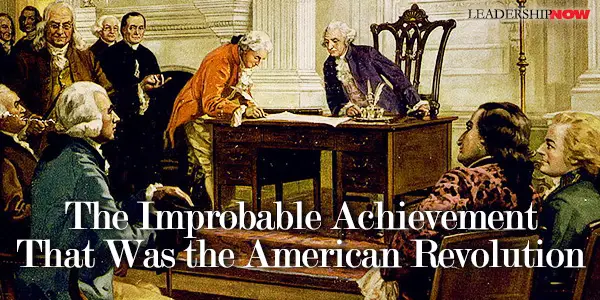 |
 |
07.04.22

The Improbable Achievement That Was the American Revolution
AMERICAN writer and pamphleteer Thomas Paine believed that it was common sense that an island could not rule a continent. “No event in American history which seemed so improbable at the time has seemed so inevitable in retrospect as the American Revolution,” writes Joseph Ellis in Founding Brothers. He adds: The creation of a separate American nation occurred suddenly rather than gradually, in revolutionary rather than evolutionary fashion, the decisive events that shaped the political ideas and institutions of the emerging state all taking place with dynamic intensity during the last quarter of the eighteenth century. No one present at the start knew how it would turn out in the end. It is easily assumed that all of the citizens of the American colony were on the same page. How else could it have worked? “The very term ‘American Revolution’ propagates a wholly fictional sense of national coherence not present in the moment.” It is only in hindsight that we assume the outcome. It is ironic that the very thing they were fighting against was an element in the nation they were trying to create. The key insight shared by most of the vanguard members of the revolutionary generation, is that the very arguments used to justify succession from the British Empire also undermined the legitimacy of any national government capable of overseeing such a far-flung population, or establishing uniform laws that knotted together the thirteen sovereign states and three or four distinct geographic and economic regions. The creation of the United States was a daunting task, to say the least. The United States is the world’s oldest enduring republic because “in 1787 a tiny minority of prominent political leaders from several key states conspired to draft and then ratify a document designed to accommodate republican principles to national scale.” The core principle being personal liberty and, therefore, personal responsibility. It may be easy to criticize what they accomplished almost 250 years later, but we would be wise to remember the words of historians Will and Ariel Durant, “No one man, however brilliant or well-informed, can come in one lifetime to such fullness of understanding as to safely judge and dismiss the customs or institutions of his society, for these are the wisdom of generations after centuries of experiment in the laboratory of history.” The checks and balances that permitted the infant American republic to endure were not primarily legal, constitutional, or institutional, but intensely personal, rooted in the dynamic interaction of leaders with quite different visions and values. What made it work was trust in the intentions of the other person. Their differences provided checks on each other. Character mattered because the fate of the American experiment with republican government still required virtuous leaders to survive. Eventually, the United States might develop into a nation of laws and established institutions capable of surviving corrupt or incompetent public officials. But it was not there yet. It still required honorable and virtuous leaders to endure. What happened in Philadelphia was truly a miracle. And on July 4th, we can be grateful that they, through all of the uncertainty, made it happen. 
Posted by Michael McKinney at 10:12 AM
|
BUILD YOUR KNOWLEDGE
 

How to Do Your Start-Up Right STRAIGHT TALK FOR START-UPS 
Grow Your Leadership Skills NEW AND UPCOMING LEADERSHIP BOOKS 
Leadership Minute BITE-SIZE CONCEPTS YOU CAN CHEW ON 
Classic Leadership Books BOOKS TO READ BEFORE YOU LEAD |